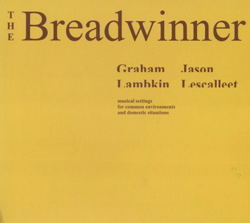
Lambkin and Lescalleet have been cagey indeed in their recent musical endeavors. Both have pecked at the referential reserves - Salon Run and The Pilgrim gestured, in however confusing a manner, at private universes - though ultimately less out of desire to see them materialized in servile forms, which would render them easily exchangeable, and more in a concentrated effort to lure them into other spaces, one's where their decay and metamorphosis would be at play, where they would remain upset, absent from themselves, in this sense, singular.
So too for The Breadwinner the duo tap into a private world, that of Lambkin's home. Rather than merely applying a stethoscope to it, monitoring it as a doctor does a mother's writhing womb, they play it and are themselves played. Generators, appliances, and pipes come alive spontaneously like organs awakening, while the pair, pulling up floorboards, beating pipes, and creating coagulations of electrical drone, are more combative than compatible, pushing the surrounding sounds onto multiple twists and turns, or else layering them and accentuating different textures at various times, drawing out harmonic material to play with, and finally highlighting their fluctuations of force.
During "E5150/Body Transport" gusts of wind and pipe water become resources for spontaneous musique concrete effects, but at the same time they never lose their place in the broader swirl of alternately subtle and demonstrative details. Such works progress in gradual escalations and hypnotic waves, the details growing surprisingly lucid and then retreating into either tense silences, thick soundscapes or unclassifiable experimentation. Patterns shift at every angle on certain pieces, though later the duo shift gears and, while still leaving room for confounding variables to enter the frame, explore an economy of phrasing and accuracy of timing that focuses the concentration on minute details and alterations. One of the albums strongest moments, "Two States", is beholden to precisely these principles: the piece features fractured percussive tapping, light breathing, and a succession of watery notes and phrases that hang in the air such that their disjointedness invokes a multitude of options in an undefined field of implication and potentiality. This fine sense of touch and timing permeates so many other places; the title track and "There And Back Again", as they relay tension and suspension through wisps, hints and traces or, as in the case of "Listen, The Snow Is Falling", simple transfiguration and revelation through the sensitive pulling of a child's voice into the other ambient noises in such a way that the piece eventually takes on a splendidly organic coherence.
This uncanny combination of carefully planned event and loose spontaneity burns a singular stamp into the proceedings while the manipulation of and occasional confusion between art and reality results in a sort of aesthetic intoxication. The album stands as a serious engagement with issues of art, order and understanding, and is at the same time eminently listenable. After having each released career highlights, The Breadwinner reveals that neither Lambkin nor Lescalleet have yet to exhaust all of their resources.
Comments and Feedback:
|



